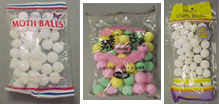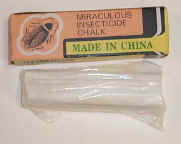Avoid Illegal Household Pesticide Products
Información relacionada disponible en español
Pesticide products that are sold or distributed without a valid EPA registration (other than certain minimum risk products that are exempt from registration) are referred to as illegal pesticides. These products can harm you, your family and pets, as well as the environment. Registered pesticide products have been evaluated by EPA for safety.
Illegal pesticides:
- Often are very toxic.
- Have not undergone the strict safety testing we require for EPA-approved (registered) pesticides. Read about pesticide registration.
- Can be counterfeit or copy-cats – they are made to look like EPA-approved products.
- Often do not have important safety information, such as warnings about keeping children and pets away from the product.
Illegal pesticides may be sold on the street or in small neighborhood stores. They go by names like Tres Pasitos or Chalk and they often guarantee to kill roaches, mice and other household pests.
Other common pesticide products that have illegal versions include flea and tick repellents for pets, antibacterial cleansers, mothballs, and other products that claim to get rid of household pests.
We take enforcement action against companies selling or distributing illegal pesticides.
Common Illegal Pesticide Products

- Illegal naphthalene moth repellent products -- mothballs -- are hazardous to young children. Mothballs can easily be mistaken for candy, or simply tempt young children to touch and play with them. Recent studies link naphthalene to illnesses, including nasal cancer. Widespread sale of illegal mothball products is a particular concern.
- Illegal pet products, including foreign versions of the well-known EPA-registered pet products Advantage and Frontline, have been illegally imported and sold throughout the United States. Though registered for use in other countries, some foreign-labeled versions omit important warnings pertaining to children or give doses in metric units, which can cause Americans to accidentally over-dose or under-dose pets.
Read more about counterfeit pesticide products for dogs and cats.


- Illegal insecticide chalk is dangerous. Also known as "Miraculous Chalk" or "Chinese Chalk," you may have seen it sold in a neighborhood store or on the street for about $1 a box. It is mostly imported illegally from China and often bears a label in both English and Chinese. Sometimes the manufacturer claims that the chalk is "harmless to human beings and animals" and "safe to use." These claims are untrue and dangerous.
Children can easily mistake insecticide chalk for blackboard chalk or put it in their mouths. Some insecticide chalks can cause serious health problems, including vomiting, stomach pains, convulsions, tremors, loss of consciousness, and serious allergic reactions.
- "Tres Pasitos" is imported illegally from Mexico and other Latin American countries. Its name means "three little steps" in English, because after eating it, this is all mice can muster before dying. The chemical in "Tres Pasitos" is called aldicarb, a very toxic chemical that must never be used in your home.
Children are especially vulnerable to poisoning when aldicarb is sprinkled around the home to control roaches, mice and rats. Aldicarb can cause weakness, blurred vision, headache, nausea, tearing, sweating, and tremors. High doses can kill people because it paralyzes the respiratory system. - Household products treated with antibacterials. Pesticide preservatives (antimicrobials) are sometimes used to protect household products such as cutting boards, kitchen sponges, cat litter, toothbrushes, and toys from bacteria and other microorganisms.
- Products can legally claim that the the product itself is protected from microorganisms. However, consumers should be aware that those products do not protect people from disease.
- If a product claims to kill germs or to protect people from microorganisms, it is illegal unless it is registered for that purpose by EPA.
- Companies must provide us with testing that proves public health claims are true before we will register their product. If you see a public health claim, do not buy the product unless you see an EPA registration number on the product’s label.
Read more about consumer products treated with pesticides.
What You Should Do
All illegal pesticides products should be avoided. You have no way of knowing how dangerous an unregistered pesticide is because it has not been tested for safety.
Simple rules to follow when buying a pesticide:
- Look for an EPA registration number on the pesticide's container. This number tells you that EPA has examined the safety testing.
- Look for a list of the active ingredients on the label. Any product registered with EPA must state the active ingredients on the label.
- Trust your instincts. Shop for pesticides only in stores you know and trust. Don’t buy products that are packed or wrapped suspiciously.
- Contact the EPA Regional Pesticide unit for your location or call the National Pesticide Information Center at 1-800-858-7378. We will answer any questions you might have about pesticides you are thinking of using in your home.
- Be aware that some pesticides are not meant to be used in the home (like farm pesticides). The product label will tell you where the product can be used.
- Always read the label first. EPA must approve all pesticide labels before products can be sold. If you follow all the label directions, you will reduce your risk of harming yourself, your pets, and the environment. The label provides important information you need to protect yourself and your family.
